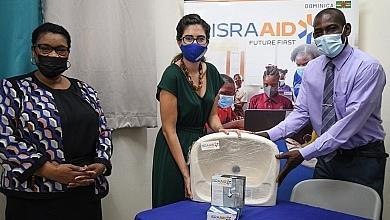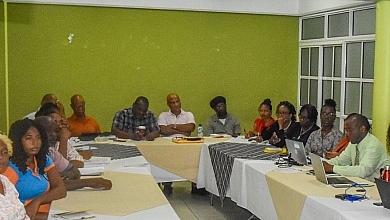UNDP provides support to the Division of Agriculture
The Division of Agriculture is now better prepared to effectively respond to the needs of farming communities in Dominica which form an integral part of the island’s economic infrastructure. Under the leadership of the Government of Dominica and with support from the Government of Japan and UNDP Barbados and the Eastern Caribbean, through the Strengthening Disaster Management Capacity of Women in the Cooperative Republic of Guyana and the Commonwealth of Dominica Project, two 4×4 FORD Ranger Trucks were handed over today to the Agriculture Extension Officers of the Division. The 3-year project aims to support hazard-prone communities, especially vulnerable groups, including women, in strengthening disaster and climate risk resilience towards enhancing sustainable livelihoods within such communities. The project targets the three parishes of St. David, St. Paul and St. Patrick.
The 4×4 vehicles are earmarked to be used by Extension Officers to facilitate the delivery of community and farm-level support services in gender-responsive disaster risk resilience and climate change adaptation agricultural practices. Thus far on the project, Extension Officers have been trained to effectively provide technical support to vulnerable farming communities using Participatory, Integrative Climate Smart Agriculture (PICSA). PICSA is a participatory approach for climate services which combines historical climate data and forecasts with farmers’ knowledge of what works in their own context, and then uses collaborative planning methods to help them make informed decisions about their agricultural practices.
Mr. Stanton Guiste, Extension Officer in the Division of Agriculture expressed his appreciation noting, “We are grateful for these two vehicles; for us, it’s coming at the right time to support our work with visiting crop and livestock farmers, in transferring the knowledge of PICSA to farmers in vulnerable communities”
Ensuring Officers can easily and safely mobilize into the communities to reach farmers with information and support is imperative, not only to the success of this project but to the attainment of universal climate-smart agricultural practices. Reaching the most vulnerable groups and communities and improving their ability to prepare for and recover from climate-related risks is critical, even more so now given the significant impact COVID-19 has had on the socio-economic landscape of the island.
UNDP is committed to supporting the Ministry of Blue and Green Economy, Agriculture and Food Security in building resilience within the sector.
This article is copyright © 2020 DOM767









